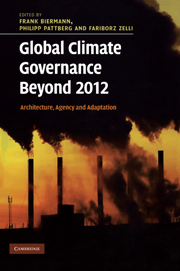Book contents
- Frontmatter
- Contents
- List of contributors
- Preface
- List of abbreviations
- 1 Global climate governance beyond 2012
- Part I Architecture
- Part II Agency
- 9 Agency in global climate governance
- 10 The role and relevance of networked climate governance
- 11 Carbon market governance beyond the public–private divide
- 12 A staged sectoral approach for climate mitigation
- 13 Technological change and the role of non-state actors
- Part III Adaptation
- Index
- References
9 - Agency in global climate governance
setting the stage
Published online by Cambridge University Press: 05 July 2014
- Frontmatter
- Contents
- List of contributors
- Preface
- List of abbreviations
- 1 Global climate governance beyond 2012
- Part I Architecture
- Part II Agency
- 9 Agency in global climate governance
- 10 The role and relevance of networked climate governance
- 11 Carbon market governance beyond the public–private divide
- 12 A staged sectoral approach for climate mitigation
- 13 Technological change and the role of non-state actors
- Part III Adaptation
- Index
- References
Summary
Introduction
It has almost become a truism that global climate governance is about more than bargaining among governments within the United Nations climate convention. For many observers of the climate negotiations, side-events have been for some time as interesting as the official negotiations. Already around the Kyoto negotiations of 1997 many important activities took place in parallel with the official negotiations among governments. The idea of side-events had diffused from the forums of non-governmental organizations that had accompanied the series of high-level UN conferences in the early 1990s.
A brief glance at the numerous side-events at any conference of the parties may serve as an illustration of the multiplicity and complexity of contemporary climate governance and, consequently, can help to illuminate from where ideas about ‘agency beyond the state’ have emerged. Already at the fourth conference of the parties in Buenos Aires in 1998, the insurance industry held seminars on the increased frequency and costs of extreme weather events. The Climate Action Network drew media attention to its ‘Fossil of the Day Award’ and organized seminars on justice and equity with regard to emissions of greenhouse gases. The Global Commons Institute presented early work on ‘contraction and convergence’ as an approach to stabilize atmospheric concentrations of greenhouse gases through converging per capita emissions. In several workshops, academics and policy advisors debated the implications of the newly launched Clean Development Mechanism. The nuclear power industry and the wind power industry both presented their low-carbon technologies, and the city of Curitiba held an exhibition about its public transport system as a best practice of transport-related energy efficiency. This ‘social forum’ of climate-related activities was crowded and energetic. It was, of course, much smaller and less organized compared to, for example, later meetings in Bali (2007) and Poznań (2008), where the daily Earth Negotiations Bulletin had a specific coverage of a sample of side-events.
- Type
- Chapter
- Information
- Global Climate Governance Beyond 2012Architecture, Agency and Adaptation, pp. 137 - 145Publisher: Cambridge University PressPrint publication year: 2010
References
- 9
- Cited by



